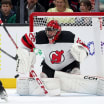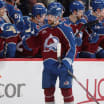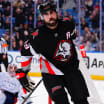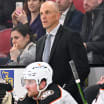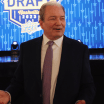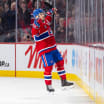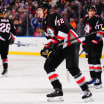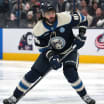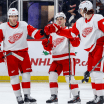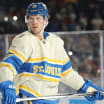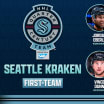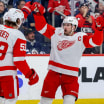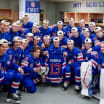Mailbag: Wild GM search, Point's next contract with Lightning
NHL.com's Dan Rosen answers weekly questions
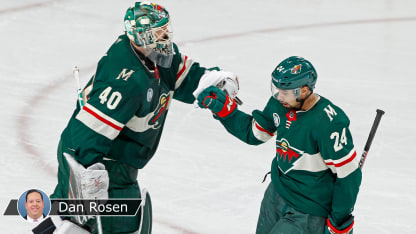
© Getty Images
What general manager available do you see as the best fit for the Minnesota Wild? Ron Hextall? Dean Lombardi? Peter Chiarelli? -- @TJRinger1
I prefer the idea of the Wild bringing in another GM-in-waiting, someone who has been learning as an assistant for a while and is ready to implement his ideas and way of doing things. I know they did that last year with Paul Fenton and it didn't work out. Fenton was assistant GM of the Nashville Predators for 12 seasons before the Wild hired him to be their GM on May 21, 2018. He lasted one season and was fired a week ago. It was the right idea at the time to hire someone with Fenton's experience and hunger; the Wild just obviously felt their choice was wrong. They still need fresh ideas, something new. They need someone to change the fabric and culture of the organization, which for too many years now has been kind of stale, not all that exciting. They need someone who can work with the players on the current roster because making major changes this late into the offseason is unlikely and nearly impossible, but also able to instill his way of thinking, his authority and his culture. They need a modern approach and more excitement.
The names I've heard associated with the job are Bill Guerin (Pittsburgh Penguins), Tom Fitzgerald (New Jersey Devils), Norm Maciver (Chicago Blackhawks), Scott Mellanby (Montreal Canadiens) and Mark Hunter (formerly with the Toronto Maple Leafs). It's hard to say who is the best candidate in that group because nobody really knows, but all of them fit the mold of who I think the Wild should be looking at. Fenton did too. It didn't work out. That doesn't mean the Wild should abandon that philosophy. They should try again with someone with similar experience. It's still the right idea.
Russo has the latest on the Wild's GM search
Should Brayden Point consider a bridge deal considering how Nikita Kucherov's worked in his favor? -- @hawkeystix88
It's a reasonable consideration and it wouldn't surprise me if the Tampa Bay Lightning are pushing for it.
A bridge deal, meaning a contract likely 3-5 years in length, should help the Lightning keep Point's NHL salary cap charge lower than if he were to sign a seven- or eight-year contract. A long-term contract would likely carry Point, who is 23 years old, into his 30s and through some of unrestricted free agent years, which under the current collective bargaining agreement start for Point when he's 27 years old. That's the opening of his prime earning potential window, so a long-term contract would have to account for that and the cap charge would be higher.
The benefit of a bridge deal for Point is that he could have another three seasons like the one he just had (41 goals, 51 assists for 92 points in 79 games) and that would give him a chance to earn more money in his next contract. For example, if he signs a four-year contract worth $34 million (cap charge $8.5 million) and has four seasons similar to last season, his next contract could be eight years and worth perhaps $11 million or $12 million annually. He'd be betting on himself but making more money over the long term. This is exactly what happened with Kucherov. He signed a three-year, $14.3 million contract on Oct. 11, 2016. He had 85 points (40 goals, 45 assists), 100 points (39 goals, 61 assists) and 128 points (41 goals, 87 assists) in each year of the contract. He signed his eight-year, $76 million contract extension on July 10, 2018.
TBL@STL: Point taps in McDonagh's feed for 40th goal
If the New Jersey Devils can get at least League-average goaltending this year could you see them making a deep playoff run? -- @BenAscone
It's going to take better than League-average goaltending for the Devils to get into the Stanley Cup Playoffs. I won't speculate on a long run, but to me the Devils appear solid enough in the other positions to make the playoffs if they get quality goaltending from Cory Schneider and Mackenzie Blackwood. But there are two reasons I say they'll need better than average goaltending.
No. 1: Odds are if a team gets League-average or below goaltending, it won't make the playoffs. Using last season, 12 of the 17 teams that finished equal to or worse than the League average of a .905 save percentage missed the playoffs; that means 73.3 percent of the teams that qualified were better than the League average. The Devils had a .895 save percentage and finished 26 points out of a playoff spot.
No. 2: The Devils look good on paper, but it's too soon to tell if they're built to withstand subpar goaltending in the same way as the San Jose Sharks last season, when they had an .889 save percentage. Even the Vegas Golden Knights (.905), Washington Capitals (.904) and Calgary Flames (.903) had the experience and offensive wherewithal to make the playoffs with ease last season despite being right around the League average in save percentage. The Columbus Blue Jackets (.904) made it on the second-to-last day of the season after loading up at the 2019 NHL Trade Deadline. They also had two-time Vezina Trophy winner Sergei Bobrovsky have a .946 save percentage in 13 games from March 5 to the end of the regular season after having a .904 save percentage in his first 49. The Devils have question marks, even though I do think of them as a legitimate playoff contender this season. Will center Jack Hughes' talent transfer to the NHL in his first season? Will left wing Nikita Gusev be a difference-maker? Will center Nico Hischier take his game to the next level? Will the defense hold up around P.K. Subban? Will left wing Taylor Hall stay healthy? If yes to all and the goaltending holds up, I think the Devils will be a playoff team.
OTT@NJD: Schneider earns first shutout since 2017
Which coach or coaches are under the most pressure this upcoming season? -- @\rodrigues\20
Wild coach Bruce Boudreau has to be wondering about his long-term future now that he will be working under his third GM in four seasons. Minnesota missed the playoffs last season. It lost in the Western Conference First Round in each of Boudreau's first two seasons. As I stated earlier, the Wild need a jolt.
The Winnipeg Jets took a backward step last season. They had 99 points and lost in the first round. They had 114 points and reached the Western Conference Final in 2017-18. There's pressure on coach Paul Maurice to move the Jets forward again this season. There was too much talent in Winnipeg for the Jets to lose in the first round last season. There's consolation that it was to the eventual Stanley Cup champion St. Louis Blues, but it was a blow because that was the Jets' chance to win with forwards Patrik Laine and Kyle Connor on entry-level contracts and captain Blake Wheeler counting for $5.6 million on the salary cap. Laine and Connor are restricted free agents and will get significant raises. Wheeler's new contract kicks in this season, counting for $8.25 million on the cap. These are reasons Winnipeg's defensemen lost three main contributors from last season. Jacob Trouba was traded to the Rangers, Tyler Myers signed as an unrestricted free agent with the Vancouver Canucks, and Ben Chiarot signed with the Montreal Canadiens. The Jets couldn't afford them anymore.
I expect the Predators and Toronto Maple Leafs will be Stanley Cup contenders, but there's certainly pressure on their coaches, Peter Laviolette and Mike Babcock. The Predators and Maple Leafs each lost in the first round last season. Toronto hasn't won a playoff series in four seasons under Babcock. The Predators have regressed in the playoffs in each of the past two seasons under Laviolette. They went to the Stanley Cup Final in 2017, lost in the second round in 2018 and in the first round last season.
What is the probability of the New York Rangers trading Chris Kreider either now or at the trade deadline? -- @BigZ26
This one is dicey, but I think there has to be a high probability of Kreider getting traded at some point. The 28-year-old forward has one season remaining on a four-year contract, and it's hard to fathom how the Rangers will be able to sign him to what would likely be a lucrative long-term contract without the salary cap going up significantly next season, which is not expected to happen. They will have close to $7.5 million in dead money on their salary cap next season because of buyouts of defensemen Kevin Shattenkirk and Dan Girardi. That's the short-term issue to contend with. The long-term considerations are future contracts for at least forwards Kaapo Kakko, Vitali Kravtsov and Filip Chytil. We're talking three years down the road for Kakko and Kravtsov, and two for Chytil, but it all matters in planning. Kreider might fit in the Rangers' plans this season and next, but it's a serious gamble if they give him a long-term contract, which he wants, when they have a number of young forwards coming along. It would be a question of how or where Kreider fits on the roster when he's in his 30s. That's likely why a trade is more likely than re-signing Kreider, but then it becomes a question of when.
It selfishly benefits the Rangers to have Kreider on the roster for at least part of this season because he can be helpful to Kakko and Kravtsov while being a dangerous scoring threat to complement forward Artemi Panarin. But what if the Rangers are in contention to make the playoffs in late February, right around the time of the 2020 NHL Trade Deadline? How do you sell it to your team that trading Kreider is in the best interest? That's saying the future matters more than the present. That's not easy to swallow for the active players and coaches, but it might be what has to happen. And it might not be so bad; if Kreider plays well, the Rangers will be in the mix, his stock will rise, New York will be able to get the experience it wants of being in a playoff race and still likely trade its best commodity for a fair market price. Maybe at that point the young players are flourishing and the Rangers will be able to withstand the loss of Kreider. It makes no sense to keep Kreider and lose him for nothing next summer even if it means the difference between making and missing the playoffs, which is a stretch to begin with.
CBJ@NYR: Zibanejad fakes shot, sets up Kreider
